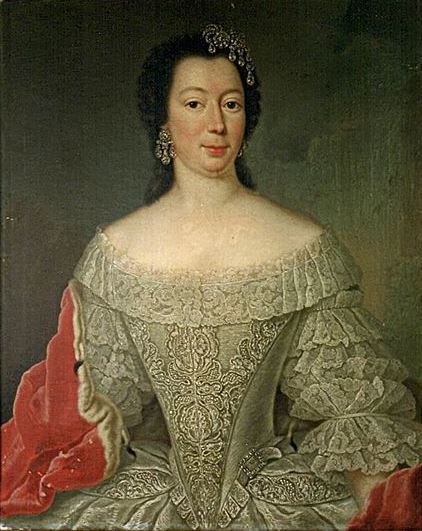#Albertine of Brandenburg-Schwedt
Photo

Albertine, Princess of Anhalt-Bernburg (21 April 1712 – 7 September 1750) was the second wife and consort of Victor Frederick, Prince of Anhalt-Bernburg.
#Albertine of Brandenburg-Schwedt#House Hohenzollern#XVIII century#people#portrait#paintings#art#arte
1 note
·
View note
Photo










House of Hohenzollern & of Oldenburg: Princess Luise Ulrike of Prussia
Luise was the tenth child and sixth daughter of King Frederick William I of Prussia and his wife Princess Sophia Dorothea of Hanover. She was the sister of Frederick the Great, Margravine Wilhelmine of Brandenburg-Bayreuth, Margravine Friederike Luise of Brandenburg-Ansbach, Margravine Sophia Dorothea of Brandenburg-Schwedt, Princess Anna Amalia, Abbess of Quedlinburg and Princes August Wilhelm, Friedrich and August Ferdinand of Prussia.
Unlike most of her older siblings, she was interested in the military from a young age. This made her her father’s favourite child and her mother once said that Luise’s father could never say no to her. She was closest to her sister Sophia Dorothea and her younger brother August Wilhelm. Luise also shared interests in science and culture with Frederick the Great and he corresponded with her about his war experiences for most of his life. At her mother’s court she was introduced to Voltaire with whom she corresponded for the rest of her life.
Several high-ranking dynastic marriage were considered for Luise, among them ones to Britain, Spain and Hesse. In the end, it was decided that she should marry the future Swedish King. However her brother initally wanted to marry her sister Anna Amalia to Adolf Frederick, mainly because he thought her easier to control than Luise Ulrike, who was described as arrogant, haughty and scheming by contemporaries.
And scheme she did. Luise was a supporter of a absolute monarchy while Sweden, her new home was a parliamentary monarchy. During her tenure as Crown Princess and Queen, she allied herself with those that would support her ideas and did not even fear to plan coups. Furthermore, she stayed loyal to her homeland of Prussia and opposed Sweden’s declaration of war against Prussia in the Seven Years’ War. However, Luise’s power was closely linked to her husband. When his health declined and her son was declared an adult, she unsuccessfully opposed him receiving a seat in the royal council. Their strained relationship got even worse when Gustav decided to honor his engagement to his Danish bride instead of marrying his mother’s Prussian candidate. Luise retaliated by harrassing the bride once she arrived at court.
Nevertheless, Gustav ordered his mother be protected when his father died since he feared for her safety due to her having become more and more unpopular. When her son overthrew the parliamentary monarchy and replaced it by an absolutist one, she congratulated him. She was in Swedish Pomerania at the time they declared their loyalty to Gustav’s new constitution. His uncle Frederick the Great warned his mother that they were facing war now, Luise declared that she would defend the province against Prussia and everyone else attacking with her own blood.
The final blow to her relationship with her oldest son came during the succession scandal of 1777/78. Luise was visited by her younger sons who told her about all the women at court having affairs, except herself. She said that her daughter-in-law surely must be an exception as well, and her sons laughed and asked whether she hadn’t heared the rumors of Sophia Magdalena’s affair with Adol Fredrik, Count Munck. Luise ordered Prince Charles to investigate the situation. So Charles talked to the Count, who talked to the King and the King again talked to his brother Charles who blamed the whole situation on his mother. When Gustav’s son was born in 1778, the conflict erupted since Luise accused her son of having his son fathered by another man. She was supported by her favourite children Sophia Albertine and Frederick. In return, Gustav threatened to exile his mother to Pomerania. In the end, the entire royal family, except the royal couple, was forced to sign a declaration in which they resign their accusations. The relationship between mother and son remained broken until she was on her deathbed.
Luise Ulrike died in Svartsjö Palace, outside of Stockholm, on July 16th, 1782. She was 61 years old, and would have celebrated her 62nd birthday just 8 days later.
// Grace Molony in The Great.
#historyedit#women in history#historic women#Louisa Ulrika of Prussia#german history#swedish history#european history#Louise Ulrika of Sweden#Luise Ulrike of Prussia#Luise Ulrike of Sweden#House of Hohenzollern#House of Oldenburg#1700s#18th century#Prussian history
195 notes
·
View notes
Text
The Kids of Frederick William I. and Sophie Dorothea of Hanover
Bolded: The name they were called by (the ones I know at least)
1. Friedrich Ludwig (1707-1708)
2. Friederike Sophie Wilhelmine (1709-1758)
Margravine of Bayreuth. Apparently the only woman of her century to create an opera. Favourite sister of Frederick II., well known for her memoirs, could not stand Katte. Apparently wore a lot of makeup and didn’t admit it. Talked a lot of smack.
3. Friedrich Wilhelm (1710-1711)
4. Karl Friedrich (1712-1786)
The one and only edgy Crown Prince
5. Charlotte Albertine (1713-1714)
6. Friederike Luise (1714-1784)
Margravine of Ansbach. Described as beautiful with a tendency to use rather crass language. Was spoiled as a child. Had an unhappy marriage and spent most of her life alone in her palace in the middle of nowhere, had, apparently, no hobbies. Insisted to be called “Your Highness” although her rank as a Margravine did not really warrant that.
7. Philippine Charlotte (1716-1801)
Duchess of Braunschweig-Wolfenbüttel. Known to be very clever, funny, and, like many of her siblings, musical. Was her father’s favourite daughter. Left 4000 volumes to the library of Wolfenbüttel. Supported poets, some of which are still well known today.
8. Ludwig Karl Wilhelm (1717-1719)
9. Sophie Dorothea Marie (1719-1765)
Margravine of Brandenburg-Schwedt. One of the non-intellectual kids. Had an unhappy marriage and lived alone in her own palace.
10. Luise Ulrike (1720-1782)
Queen of Sweden. Showed an early interest in the military. Like many of her siblings, she was interested in the arts and supported them. Was apparently not too popular in Sweden after she tried to get the Monarchs more power next to the Parliament.
11. August Wilhelm (1722-1758)
You’ll see. He’ll be part of the main storyline.
12. Anna Amalie (Amélie) (1723-1783)
Princess-Abbess of Quedlinburg. Spent most of her life in Berlin, studied music theory, collected music, supported musicians, and composed.
13. Friedrich Heinrich Ludwig (1726-1802)
Henry my boy! He too is part of the main storyline. Frederick 2.0 - now even gayer.
14. August Ferdinand (1730-1813)
Ferdinand married his niece (daughter of Sophie) and built Schloss Bellevue, the presidential palace of Germany.
21 notes
·
View notes